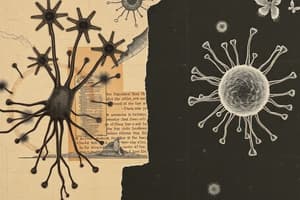Podcast
Questions and Answers
What is the first step of phagocytosis according to the sequence?
What is the first step of phagocytosis according to the sequence?
- Formation of phagosome
- Digestion and destruction
- Ingestion of microbe by phagocyte
- Chemotaxis and Adherence (correct)
Which of the following is NOT a stage of inflammation?
Which of the following is NOT a stage of inflammation?
- Formation of antibodies (correct)
- Radiation response
- Increased vascular permeability
- Cytokine storm
What component helps provide the initial defense response against pathogens?
What component helps provide the initial defense response against pathogens?
- White Blood Cells (WBCs) (correct)
- Hormones
- Platelets
- Antibodies
What process involves the discharge and elimination of waste materials by a phagocyte?
What process involves the discharge and elimination of waste materials by a phagocyte?
What is the significance of vaginal secretions in the immune response?
What is the significance of vaginal secretions in the immune response?
Which type of immune cell is primarily involved in combating parasitic infections?
Which type of immune cell is primarily involved in combating parasitic infections?
What term describes a lack of resistance to a disease?
What term describes a lack of resistance to a disease?
Which cells recognize antigens and produce antibodies?
Which cells recognize antigens and produce antibodies?
What is the process called that refers to blood cell formation?
What is the process called that refers to blood cell formation?
What term refers to the body's ability to ward off diseases?
What term refers to the body's ability to ward off diseases?
Which of the following is NOT considered an innate immune response?
Which of the following is NOT considered an innate immune response?
What are the two main categories of the immune system?
What are the two main categories of the immune system?
Which of these organisms is known to cause Tuberculoid leprosy?
Which of these organisms is known to cause Tuberculoid leprosy?
What type of immunity involves the production of T lymphocytes?
What type of immunity involves the production of T lymphocytes?
Which of the following statements about phagocytes is true?
Which of the following statements about phagocytes is true?
What is the first immune response to a particular foreign substance called?
What is the first immune response to a particular foreign substance called?
What is the primary function of B cells?
What is the primary function of B cells?
Which system is responsible for defending against any pathogen and is present at birth?
Which system is responsible for defending against any pathogen and is present at birth?
Which of the following components is NOT part of the immune system?
Which of the following components is NOT part of the immune system?
What is the term for the portion of the immune system that includes organs, cells, and proteins working together?
What is the term for the portion of the immune system that includes organs, cells, and proteins working together?
What type of response occurs when the immune system combats a foreign substance for the second time?
What type of response occurs when the immune system combats a foreign substance for the second time?
Which type of immunity is characterized by the production of antibodies against foreign molecules?
Which type of immunity is characterized by the production of antibodies against foreign molecules?
Which cells are specialized white blood cells that patrol the body looking for antigens?
Which cells are specialized white blood cells that patrol the body looking for antigens?
Flashcards are hidden until you start studying
Study Notes
### Innate Immunity
- Present at birth, offering immediate defense against pathogens.
- Responds rapidly, acting as the body's first line of defense.
Adaptive Immunity
- Develops over time through exposure to specific pathogens.
- Offers a more tailored and targeted immune response.
- Characterized by its specificity and memory.
- Involves the immune system's ability to "remember" past encounters with pathogens.
Phagocytosis
- A process where immune cells engulf and destroy foreign invaders.
- The steps include chemotaxis, adherence, ingestion, digestion, and discharge.
### Inflammation
- A localized reaction to injury or infection.
- Characterized by redness, swelling, heat, and pain.
- Helps to isolate and eliminate harmful substances from the body.
- The stages include the vascular stage and cellular stage.
### Immune System
- A complex network of organs, cells, and proteins that protect the body against pathogens.
- Composed of innate and adaptive immunity systems.
- Includes the lymphatic system, complement system, spleen, thymus, bone marrow and white blood cells.
### Lymphocytes
- Specialized white blood cells critical to the immune response.
- B cells and T cells are the two main types of lymphocytes.
B Cells
- Differentiate into plasma cells, responsible for producing antibodies.
- Provide humoral immunity, which targets extracellular pathogens.
T Cells
- Responsible for cell-mediated immunity, targeting intracellular pathogens.
- Mature in the thymus and recognize antigens processed by phagocytic cells.
Immunity
- The ability to resist disease.
- A combination of innate and adaptive immune responses.
Susceptibility
- Lack of resistance to a disease.
- Individuals with compromised immune systems are more susceptible to illness.
### Hematopoiesis
- The process of blood cell formation.
- Occurs in the bone marrow.
### Dual Nature of Adaptive Immunity
- Characterized by two main components: humoral immunity and cell-mediated immunity.
- Humoral immunity relies on antibodies, while cell-mediated immunity relies on specialized T cells.
- Both components aim to eradicate pathogens in different ways.
Sebum
- An oily substance secreted by the skin’s sebaceous glands.
- Provides a protective barrier against pathogens.
Normal Body Temperature
- Approximately 37°C.
- A temperature of 38°C or higher indicates an abnormal condition.
### Eusinophils
- White blood cells that fight parasites.
- Also involved in allergic reactions.
### Monocytes
- Large white blood cells that mature into macrophages.
- Macrophages phagocytize pathogens and cellular debris.
Studying That Suits You
Use AI to generate personalized quizzes and flashcards to suit your learning preferences.



